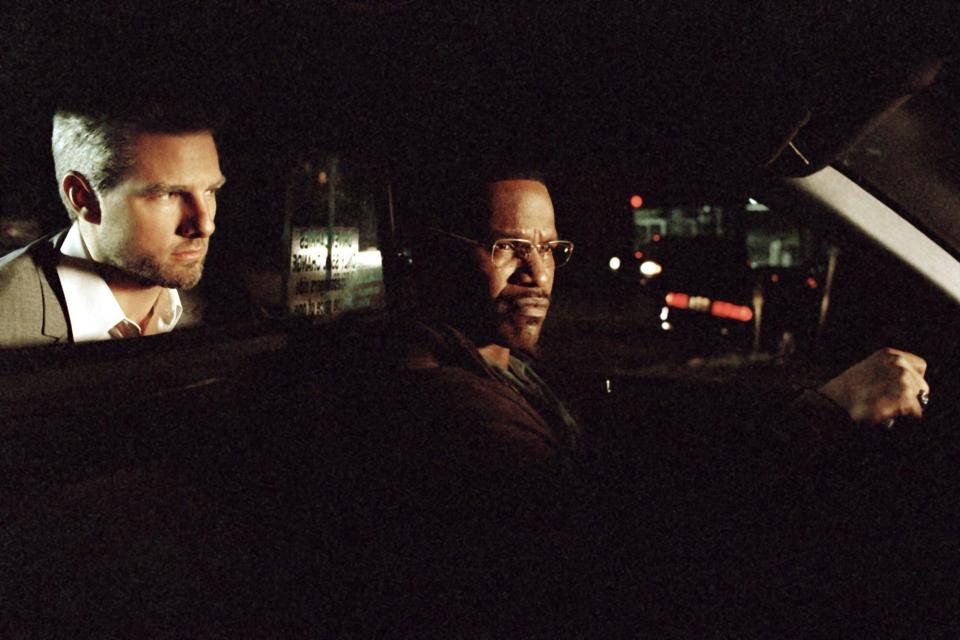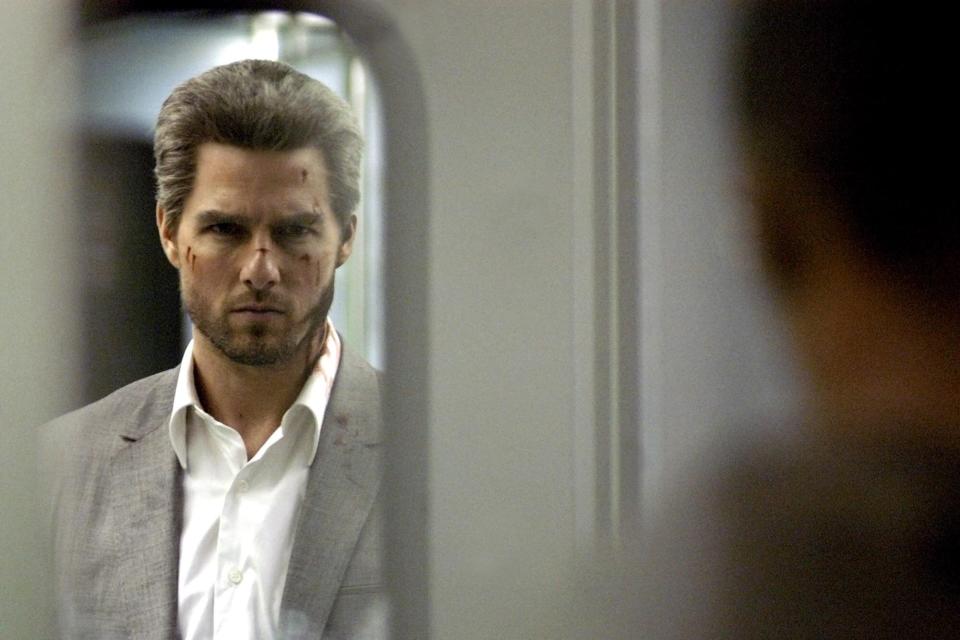Tom Cruise rewatch: Collateral turned Hollywood's biggest star into a villain for the ages

In advance of this Friday's release of Top Gun: Maverick, our writers return to their favorite Tom Cruise movies, in appreciation of an on-screen persona that's evolved over decades.
What if Tom Cruise was a monster, though? Imagine America's ever-young action boy with gray hair and stubble, breaking into homes and workplaces to shoot bullets into unsuspecting foreheads. He still laughs, but now he's laughing at you. In 2004's Collateral, Cruise plays Vincent, an assassin who rips a bloody gash through a mean Los Angeles night. The villainous casting could be a stunt, but it's more like a culmination, suggesting a soulless efficiency lurking behind all his glistening heroes.
Collateral came at everyone's magic moment. Director Michael Mann was transitioning from glittery celluloid into scuzzy digital video. Recent WB sitcom frontman Jamie Foxx was months from Oscar glory. The new millennium had found Cruise divorced and adventurous, playing three flavors of drug-addled trauma in Vanilla Sky, Minority Report, and The Last Samurai. His new normal was edgy, but also stratospheric. You started expecting him in science-fiction worlds, in historical fictions, in an empty Times Square or a distant mountain peak. Tough to picture him in the back seat of a taxi cab, or at a 24-hour gas station, or in a hospital elevator. He did not seem like someone who took public transportation.

Everett Collection
But that's his journey in Collateral, one of the best movies ever made about the multiverse of everyday Los Angeles. Vincent's a hitman from out of town, hired by a drug kingpin to slay five people in one night. He gets into a taxi driven by Max (Foxx), and offers to pay the cabbie big bucks for an all-night fare. It's a plan that shouldn't hold up to scrutiny — why not hire five hitmen to kill everyone simultaneously? — and when a body lands on the taxi, Max the regular-guy cabbie becomes a big problem. But you believe in the capability of Cruise's Vincent: Dressed in a gray suit to match his cigarette-ash hair, he moves definitively, and speaks like he planned out every conversation weeks ago.
Another actor might have played the killer as a robot. Cruise achieves something scarier: a sociopath with some charm. There's a rhythm to Vincent's patter that recalls Magnolia's manly guru, a lot of catchphrase philosophy: "Now we gotta make the best of it, improvise, adapt to the environment, Darwin, s--- happens, I Ching, whatever man, we gotta roll with it." When he reveals a tragic backstory and then laughs it off as a bad joke, you're seeing Heath Ledger's Joker four summers ahead of schedule.
Collateral delivers as a glorious gun fest. Cool Cruise is here if you want him: punch-shooting his way through a nightclub, hopping on the back of a moving train. The gray hair isn't real-looking, but I still think he still looks amazing, less silver fox than platinum wolf.

Everett Collection
Yet this is also the last great showcase (so far) for Cruise in his quieter moments: thoughtful, amazed, baffled, enraged. Something mystical was going on between Cruise and Foxx inside that taxicab; the fact that both men wound up loving the same woman, Katie Holmes, is a strange postscript. The pairing brings out something different in Cruise. Vincent gets all the heavy lines of nihilism, misfortune-cookie lines the actor delivers like gospel: "Millions of galaxies of hundreds of millions of stars and a speck on one in a blink — that's us. Lost in space." He's explaining why his killing doesn't matter, and why it's cool not to care.
Cruise has played nefarious in other films, but those other baddies always felt like costumes: blond olden-times vampire, baldcapped studio exec. With Vincent, though, Cruise seems to strip himself down. You see Cruise clearly, better than any movie this century. (Literally, too: Mann was officially in his period when the camera got follicle-close to actors' faces.)
Near the end of the movie, Max throws all that semi-Randian patter back at Vincent: "The standard parts that are supposed to be there in people, in you...aren't," he says. The look on Cruise's face is something you've never seen him do, before or since. He looks enraged, burn-it-all-down angry, but also wounded. Vincent knows he's been seen, and he doesn't like it. Notable, too, is that this is the last uncompromised moment for Cruise's fame, before the couch and the "glib" and the South Park episode. In the last 18 years, Cruise has not approached the bleakness of this performance with a thirty-foot pole. Was Collateral confessional, or even a tad prophetic? When Vincent flashes that famous smile, a shiver runs down your spine. The biggest stars make the biggest black holes. I don't know if that's physics, but that's Tom Cruise in Collateral.
Related content:

 Yahoo News
Yahoo News 
